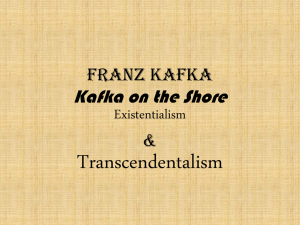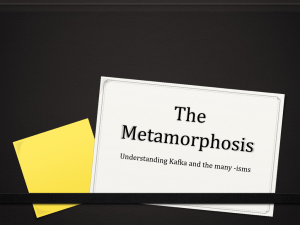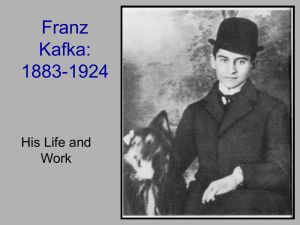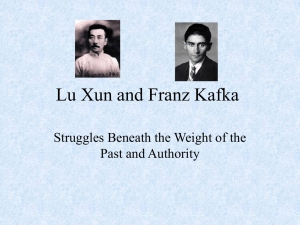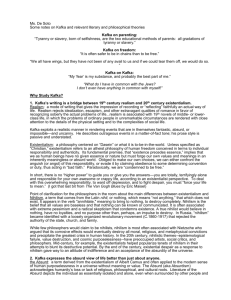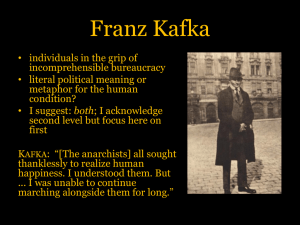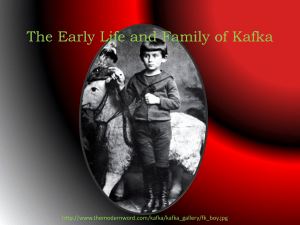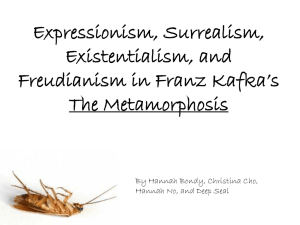Kiersten Lieurance Dr. Moe ENLT 109W Unit 1 Essay September 10
advertisement
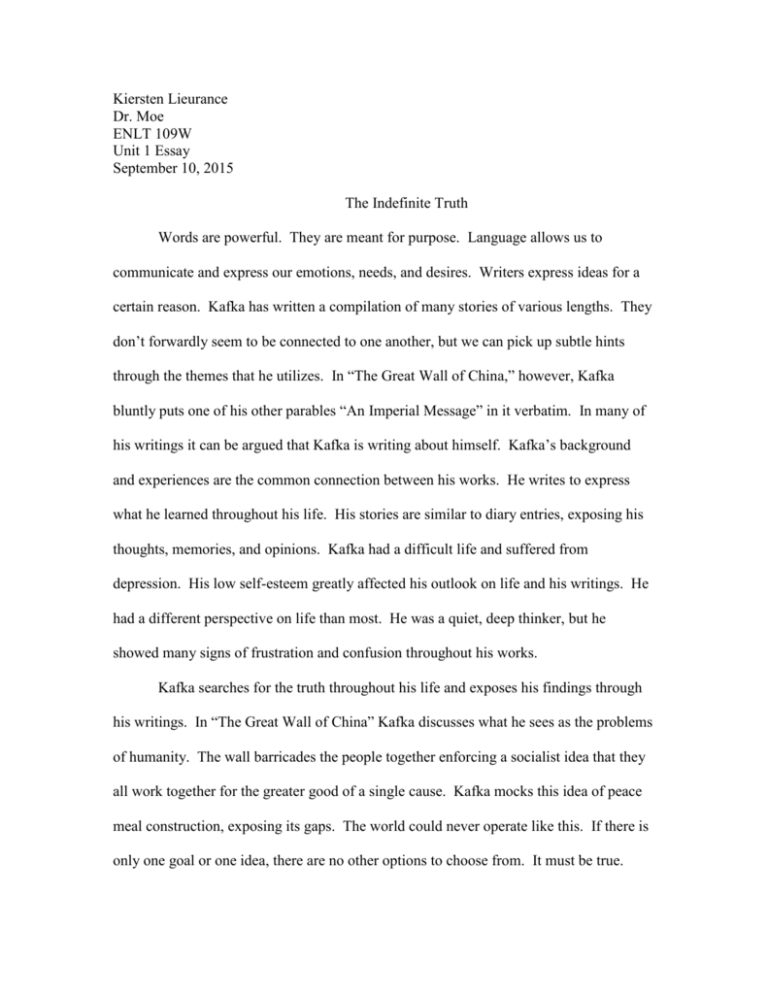
Kiersten Lieurance Dr. Moe ENLT 109W Unit 1 Essay September 10, 2015 The Indefinite Truth Words are powerful. They are meant for purpose. Language allows us to communicate and express our emotions, needs, and desires. Writers express ideas for a certain reason. Kafka has written a compilation of many stories of various lengths. They don’t forwardly seem to be connected to one another, but we can pick up subtle hints through the themes that he utilizes. In “The Great Wall of China,” however, Kafka bluntly puts one of his other parables “An Imperial Message” in it verbatim. In many of his writings it can be argued that Kafka is writing about himself. Kafka’s background and experiences are the common connection between his works. He writes to express what he learned throughout his life. His stories are similar to diary entries, exposing his thoughts, memories, and opinions. Kafka had a difficult life and suffered from depression. His low self-esteem greatly affected his outlook on life and his writings. He had a different perspective on life than most. He was a quiet, deep thinker, but he showed many signs of frustration and confusion throughout his works. Kafka searches for the truth throughout his life and exposes his findings through his writings. In “The Great Wall of China” Kafka discusses what he sees as the problems of humanity. The wall barricades the people together enforcing a socialist idea that they all work together for the greater good of a single cause. Kafka mocks this idea of peace meal construction, exposing its gaps. The world could never operate like this. If there is only one goal or one idea, there are no other options to choose from. It must be true. Kafka explains how this does not do justice for humanity. There is not only one answer, and there is not only one question. We should be looking for more and avoiding simplicity. Life is a search for truth and falling short of the truth would be pointless. There are endless lessons and experiences in life, none of which are exactly the same. Learning is a process that comes with experience. Everyone will grasp each experience a little differently, causing the lessons and findings to be infinite and unique. Is there a right answer? Or do we all have different answers? Kafka admits, “One hears a great many things, true, but can gather nothing definite” (Kafka 243). The truth is questioned in “The Helmsman.” The Helmsman represents authority, but is replaced for an unseen reason by a new Helmsman. The people follow their new leader blindly and accept what he says without second thought. The purpose of authority is to keep what is true alive and effective. However, authority can be corrupted for the sake of untrue, greedy goals. We place our faith in the concept of authority, but it may not always be true. The people in the story accepted their new leader to be faithful. They immediately followed his plans merely because he took charge. Confidence is a powerful tool. Standing up and persuading people to think a certain way can be done easily by finding the right words and being confident in what one says. Authority is a tricky concept; on paper it sounds ideal, but in reality it can easily be misleading. It is necessary to search for the real truth. The truth is not always obvious; it can be concealed under false proclamations. There is also more than one way to reach an answer. Sometimes there is more than one right answer. We believe a certain things for certain reasons. For example, authority over our country is voted upon. There are, however, two main ways to conceive these political truths: the conservative perspective and the liberal perspective. The path we choose to approach usually comes from the way our family raised us. Kafka mocks authority in this parable. His hesitance likely comes from his experience of authority in his childhood family. Kafka and his father did not get along well. He did not trust his father, yet was expected to follow along and believe what he said. As Kafka saw it, he had no reason to cooperate with his father other than the fact that his father had authority over him. Kafka did not like that this authority was enforced. Why should someone be forced to do something they disagree with? It is just our culture. We do what our elders say, because they know the truth. They have experienced life-the search for truth-and already found the answers. But if there is but one truth, there should not be a constant search for the truth if it has already been found. This leads to an understanding of Kafka’s perspective, that truth is indefinite. Kafka expresses his thoughts in a very unique writing style. He writes in the form of parables. The parables usually result in an unexpected ending. Kafka usually starts his stories in a neutral emotion, then towards the end shifts into a new idea that expresses his depression. In "A Common Confusion," Kafka is explaining a misunderstanding between businessmen as they try to meet up. The story goes on humorously until the end he abruptly falls down the stairs "in a violent rage and vanishing for good" (Kafka 430). Kafka's ability to write the unexpected is impressive. He leaves you confused and wondering how such things could happen. His tenancy is to do this with dark plot twists, again pointing to his depression. This change in events can be seen as a meta-story. There is truth in the beginning of the story, but there is an equal amount of truth in the powerful ending. Kafka may be presenting the truth as his reader would be expected to see it at the beginning, and then proving his understanding of the truth by boldly exposing the falsity of our original ideas. This strategy shows Kafka’s anger and depression. The insecurities he makes present in his work help to explain his view on certain truths. He disagrees with a majority of what the common person would find truthful and expresses his disagreement thoroughly. Upon reading "Clothes" and "Rejection" you can assess that he is or has been depressed. The clothing he discusses are outwardly pretty and flattering. He said the girls wore these beautiful things and he did not understand why. They wore the same things everyday though, and he seemed to find that unattractive. He also said that after the parties late at night they came back with less of a glow. Going into a party beautiful and leaving worn is a strong statement for the party. This could be Kafka explaining his disapproval for the parties. This could have been because he was not attending these events and he was jealous and only saw the bad in them, or he was making a point about how society follows a certain pathway no matter how they feel about it. In "Rejection," Kafka expressed the same ideas. He was depressed and lonely and thought our society had bad priorities. He overlooks the manmade fabricated truth and sees reality in a much darker light. He struggles to accept certain things as truth and argues that the truth is not pretty; the truth that he sees is not pretty. Kafka has a rough upbringing that tainted his view on many things. Everyone experiences things differently and finds different truths. Not everyone can experience the same things and find the same truths. Kafka’s depression allowed him to formulate his ideas in the shadows. The same event would have affected anybody else differently than Kafka. Our identity causes our beliefs, which are our personal truths. Kafka experienced his life in a way only he could. He had his own personal truths, but there were many other truths that may have or may not have been true around him. His childhood and experiences affected the way he viewed life and all that life encompasses. Kafka utilized his writing as an outlet for expression. He reflected on his observations and spoke out about his concerns. Kafka’s compilation of stories resulted in a diary that can only be understood by looking at the truths he valued and the truths in which he was searching. Truth is indefinite. But, truth is personal. Works Cited Kafka, Franz. The Complete Stories. Ed. Nahum N. Glatzer. New York: Schocken Books, 1971.
